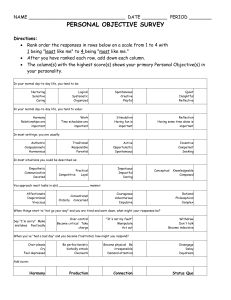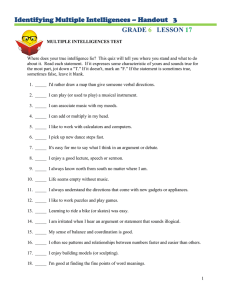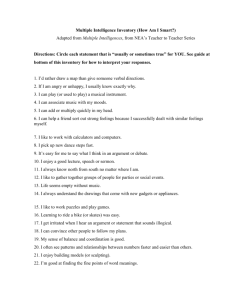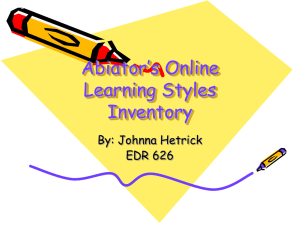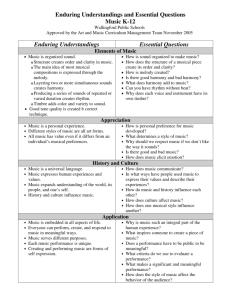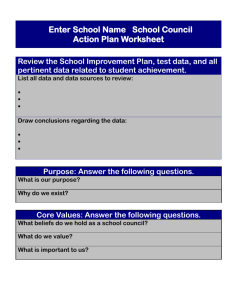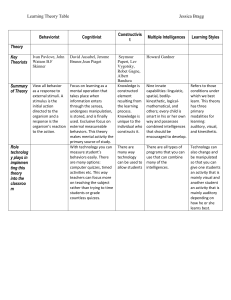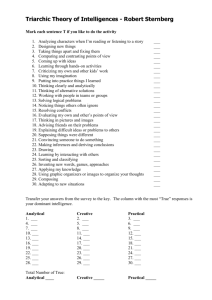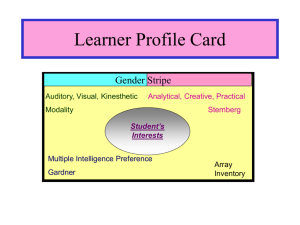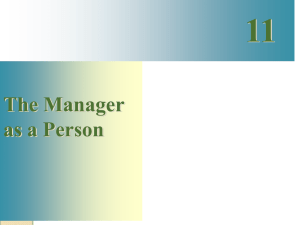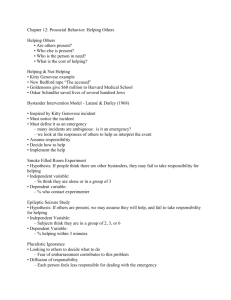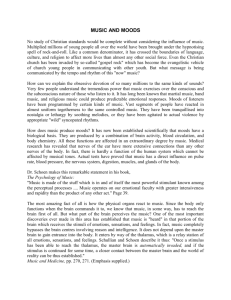Learning Inventory - Kelsey Mohapp's Portfolio
advertisement
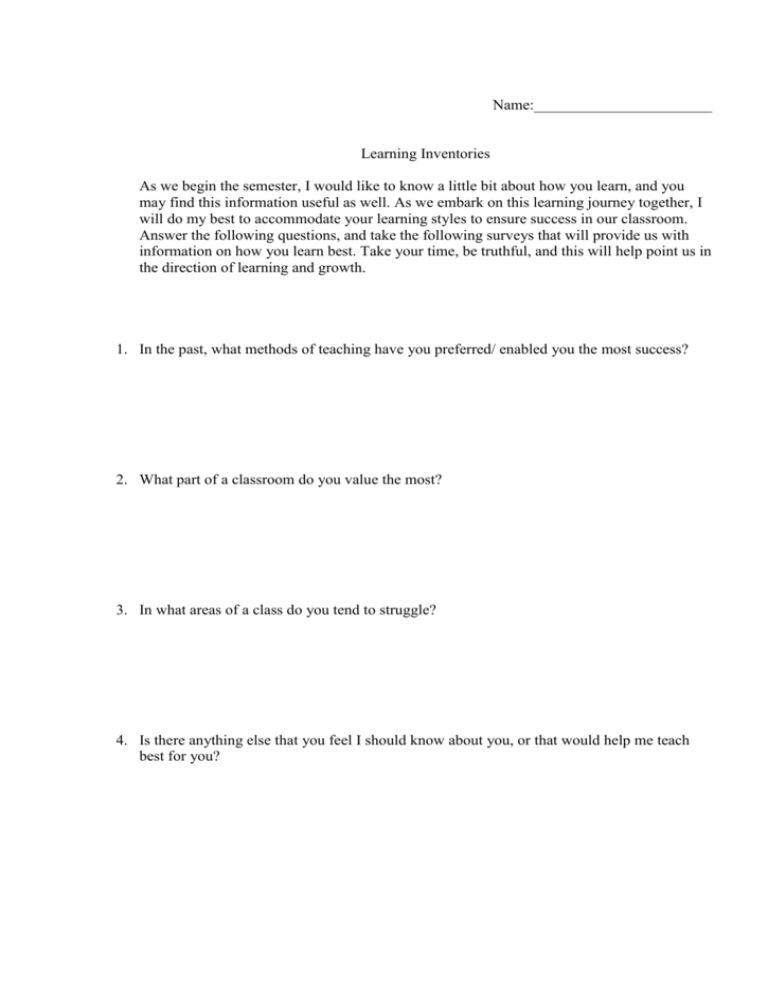
Name:_______________________ Learning Inventories As we begin the semester, I would like to know a little bit about how you learn, and you may find this information useful as well. As we embark on this learning journey together, I will do my best to accommodate your learning styles to ensure success in our classroom. Answer the following questions, and take the following surveys that will provide us with information on how you learn best. Take your time, be truthful, and this will help point us in the direction of learning and growth. 1. In the past, what methods of teaching have you preferred/ enabled you the most success? 2. What part of a classroom do you value the most? 3. In what areas of a class do you tend to struggle? 4. Is there anything else that you feel I should know about you, or that would help me teach best for you? “Triarchic Theory of Intelligences - Robert Sternberg Mark each sentence T if you like to do the activity 1. Analyzing characters when I’m reading or listening to a story 2. Designing new things 3. Taking things apart and fixing them 4. Comparing and contrasting points of view 5. Coming up with ideas 6. Learning through hands-on activities 7. Criticizing my own and other kids’ work 8. Using my imagination 9. Putting into practice things I learned 10. Thinking clearly and analytically 11. Thinking of alternative solutions 12. Working with people in teams or groups 13. Solving logical problems 14. Noticing things others often ignore 15. Resolving conflicts 16. Evaluating my own and other’s points of view 17. Thinking in pictures and images 18. Advising friends on their problems 19. Explaining difficult ideas or problems to others 20. Supposing things were different 21. Convincing someone to do something 22. Making inferences and deriving conclusions 23. Drawing 24. Learning by interacting with others 25. Sorting and classifying 26. Inventing new words, games, approaches 27. Applying my knowledge 28. Using graphic organizers or images to organize your thoughts 29. Composing 30. Adapting to new situations ___ ___ ___ ___ ___ ___ ___ ___ ___ ___ ___ ___ ___ ___ ___ ___ ___ ___ ___ ___ ___ ___ ___ ___ ___ ___ ___ ___ ___ ___ Transfer your answers from the survey to the key. The column with the most “True” responses is your dominant intelligence. Analytical 1. ___ 4. ___ 7. ___ 10. ___ 13. ___ 16. ___ 19. ___ 22. ___ 25. ___ 28. ___ Creative 2. ___ 5. ___ 8. ___ 11. ___ 14. ___ 17. ___ 20. ___ 23. ___ 26. ___ 29. ___ Practical 3. ___ 6. ___ 9. ___ 12. ___ 15. ___ 18. ___ 21. ___ 24. ___ 27. ___ 30. ___ Total Number of True: Analytical ____ Creative _____ Practical _____ The Theory of Multiple Intelligences Self Assessment Where does your true intelligence (processing ability) lie? This quiz can help you determine where you stand. Read each statement. If it expresses some characteristic of yours and sounds true for the most part, jot down “T.” If the statement is sometimes true, sometimes false, leave it blank. 1. _______ I’d rather draw a map than give someone verbal directions. 2. _______ I can play (or used to play) a musical instrument. 3. _______ I can associate music with my moods. 4. _______ I can add or multiply quickly in my head. 5. _______ I like to work with calculators and computers. 6. _______ I pick up new dance steps quickly. 7. _______ It is easy for me to say what I think in an argument or debate. 8. _______ I enjoy a good lecture, speech, or sermon. 9. _______ I always know north from south no matter where I am. 10.______ Life seems empty without music. 11.______ I always understand the direction that comes with new gadgets or appliances. 12.______ I like to learn puzzles and play games. 13.______ Learning to ride a bike (or skate) was easy. 14.______ I am irritated when I hear an argument that is illogical. 15.______ My sense of balance and coordination is good. 16.______ I often see patterns and relationships to numbers faster and easier than others. 17.______ I enjoy building models or sculpting. 18.______ I am good at finding the fine points of word meaning. 19.______ I can look at an object one way and see it turned sideways or backwards just as easily. 20.______ I often connect a piece of music with some event in my life. 21.______ I like to work with numbers and figures. 22.______ Just looking at shapes of buildings and structures is pleasurable to me. 23.______ I like to hum, whistle, and sing in the shower or when I am alone. 24.______ I am good at athletics. 25.______ I would like to study the structure and logic of languages. 26.______ I am usually aware of the expressions on my face. 27.______ I am sensitive to the expression on other people’s faces. 28.______ I stay in touch with my moods. I have no trouble identifying them. 29.______ I am sensitive to the moods of others. 30.______ I have a good sense of what others think of me. Scoring Sheet Place a checkmark by each item, which you marked as “True.” Add your totals. A total of four in any of the categories A through E indicates strong ability. In categories F through G a score of one or more means you have abilities in these areas as well. A Linguistics 7 8 14 18 25 ____ ____ ____ ____ ____ B Logical/Math 4 5 12 16 21 ____ ____ ____ ____ ____ C Musical D Spatial 2 3 10 20 23 1 9 11 19 22 ____ ____ ____ ____ ____ ____ ____ ____ ____ ____ E Body/Kinesthetic 6 13 15 17 24 ____ ____ ____ ____ ____ F Intrapersonal 26 28 ____ ____ G Interpersonal 27 29 30 ____ ____ ____ Interaction Inventory Directions: Rank order the responses in rows below on a scale from 1 to 4 with 1 being "least like me" to 4 being "most like me." After you have ranked each row, add down each column. The column(s) with the highest score(s) shows your primary Personal Objective(s) in your personality. In your normal day-to-day life, you tend to be: Nurturing Sensitive Caring Logical Systematic Organized Spontaneous Creative Playful Quiet Insightful Reflective Stimulation Having fun is important Reflection Having some time alone is important Active Opportunistic Spontaneous Inventive Competent Seeking Impetuous Impactful Daring Conceptual Knowledgeable Composed In your normal day-to-day life, you tend to value: Harmony Relationships are important Work Time schedules are important In most settings, you are usually: Authentic Compassionate Harmonious Traditional Responsible Parental In most situations you could be described as: Empathetic Communicative Devoted Practical Competitive Loyal You approach most tasks in a(n) ________________ manner: Affectionate Inspirational Vivacious Conventional Orderly Concerned Courageous Adventurous Impulsive Rational Philosophical Complex When things start to "not go your way" and you are tired and worn down, what might your responses be? Say "I'm sorry" Make mistakes Feel badly Over-control Become critical Take charge "It's not my fault" Manipulate Act out Withdraw Don't talk Become indecisive When you've "had a bad day" and you become frustrated, how might you respond? Over-please Cry Feel depressed Be perfectionistic Verbally attack Overwork Become physical Be irresponsible Demand attention Disengage Delay Daydream Production Connection Status Quo Add score: Harmony “ (Surveys From: http://www.formativedifferentiated.com/learning-profile-and-interestinventories.html)
